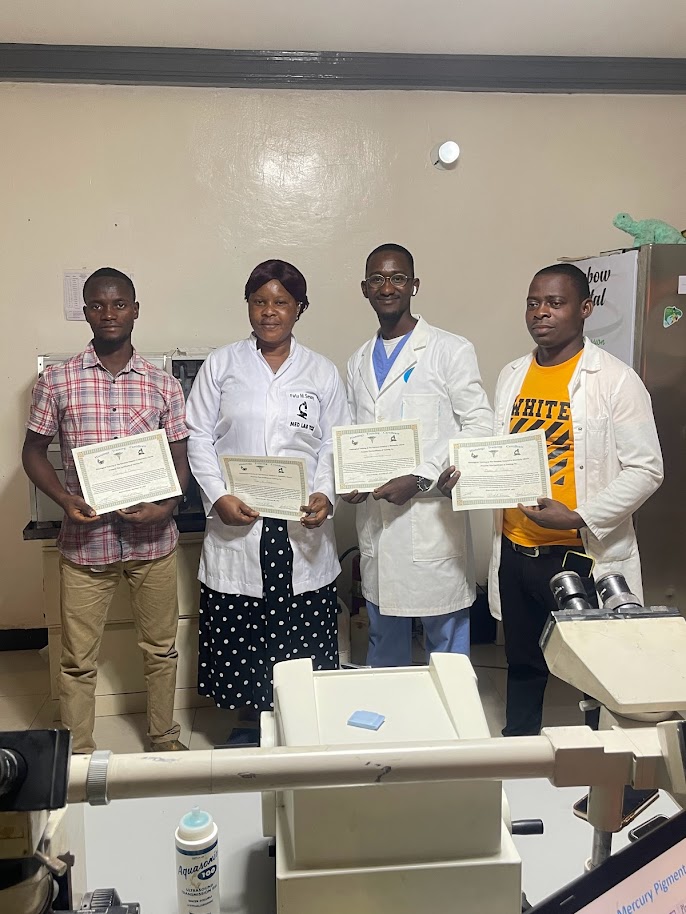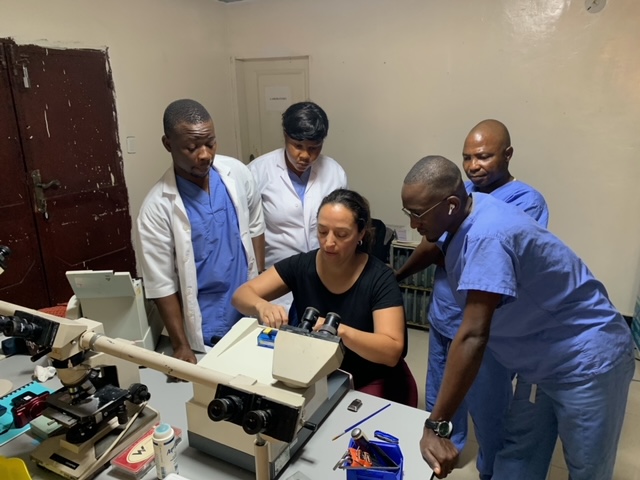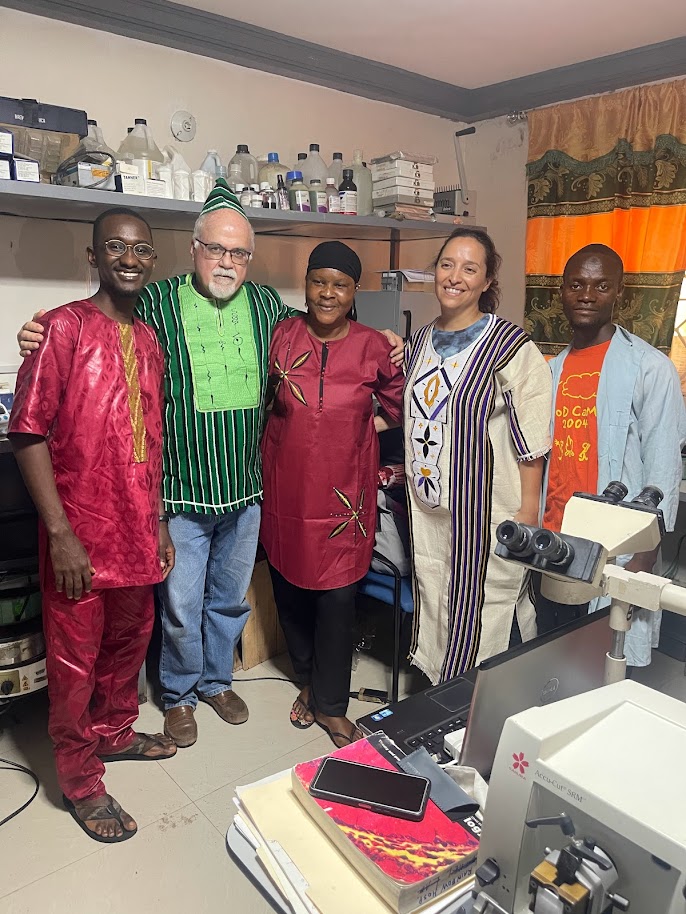I was fortunate enough to be the recipient of the NSH Lee G. Luna Foreign Travel Scholarship in 2021, which was sponsored by Sakura Finetek USA. This scholarship was given to support costs for study and/or obtaining a histotechnological education abroad (outside the US) or for an outreach program.
I applied for the scholarship in hopes of joining my colleague, David Davis, in Liberia to help establish the second histology laboratory in the country of Liberia. David was part of the first laboratory established in 2019 at JFK Memorial Hospital. He and his crew helped train the medical technicians at the hospital in histology. For this trip, we set out to establish the second laboratory at Rainbow Hospital in Monrovia.
Developing countries have a host of issues they need to overcome to provide adequate healthcare to the population, Liberia is no exception. The World Health Organization (WHO) recommends a 1:1,000 doctor to patient ratio for adequate healthcare service, yet according to a 2016 report by the Liberia Medical and Dental Council, the country has just 298 medical doctors to care for that country’s 4.5 million population, a doctor/patient ratio of 1: 15 (1). Currently there are only three pathologists in the entire country.
Setting up a new histology lab is a critical part in helping to build the infrastructure of the healthcare system in Liberia to improve patient care for the entire country.
Set-Up & Training in the New Laboratory
We had four wonderful and eager medical technicians that we trained to staff the new laboratory-Fatu, Ibrahim, Sekou, and Dr. Benedict Kolee, the pathologist who oversees the lab also assisted us with the set-up.
The first week was spent teaching the techs how to set-up the instruments needed for the lab and the beginning of histology education. They listened to several presentations on the science behind histology as well as the processes and procedures. I arrived during week two of the set-up and helped trained the techs on the basics of histology.


We started with sample receipt and documentation, followed by the process of assisting the pathologist with grossing and dictation, and continued with tissue processing, embedding, microtomy and staining for H&E. By the end of the two weeks, each tech was comfortable sectioning, placing the ribbon on the water bath and mounting a section perfectly on a slide. What would take some months to practice they were able to accomplish in days.
Before David and I flew to Liberia we were able to get some donations of consumables and with my scholarship I was able to purchase some key items that we needed to start the laboratory, including staining jars for H&E and microtome blades. Many thanks to Sakura Finetek USA who sponsored the scholarship and allowed me to purchase the necessary supplies as well as donating a VIP 5 tissue processor, which was necessary after we discovered the current processer they had was not functioning. I would like to also give acknowledgement to Newcomer Supply for their donations of consumables and Epredia for their help in acquiring some things that were hard to come by due to supply chain issues. All of these companies went above and beyond to help us with our mission, and we are very appreciative.
The instruments for the lab were older and weathered so some troubleshooting and maintenance was required to get them on-line. H&E staining is done by hand in Liberia. Currently, the laboratory does not produce enough samples to justify having a high throughput automated H&E stainer. Using an automated stainer at this stage would lead to a waste of consumables that are difficult to secure in Liberia. As a result, reagents are precious. In addition, should the stainer have any issues it would be difficult for an engineer to come and repair the instrument.
Saying Goodbye
The entire Rainbow Hospital staff was always happy, welcoming, and eager to help us in any way possible to get the lab set up. The techs showed great appreciation for everything we taught them. The pathologist, Dr. Benedict Kolee, was a gracious host and made sure we had whatever we needed during our time there. We received gifts of fruit from the staff and traditional clothing from the entire Rainbow Hospital team as a thank you for teaching the techs and helping establish the lab. Moving forward, Dr. Kolee will be responsible for the Rainbow Hospital Histology Laboratory and raising the funds to provide the services and purchase supplies.
My time in Liberia was a great experience and it also humbled me for the great fortunes I have that others lack. However, what I see as missing or lacking in Liberia perhaps Liberians do not see it at all. While Liberia is a developing country still working to improve its quality of life, the highlight will always be the great people I met while I was there, they are unforgettable, and I hope to have the chance to see them all again soon. David and I hope that Dr. Kolee is successful in all his efforts to keep the laboratory alive for many years to come.

How can you support the lab?
Donations can be submitted directly to Rainbow Hospital under the care of Dr. Benedict Kolee. If you are interested in donating, please contact David Davis via email at davidjdavis1137@gmail.com.
References(1) Gaber, Adam. Years of Impact: Liberia Adopts Yale Capstone Student Recommendations for National Medical Education Reform . April 30 2018.
Written by: Pamela Vizcarra, HTL(ASCP), QIHC (ASCP)
Originial Article: https://www.nsh.org/blogs/alisha-yocum/2023/02/02/rainbow-hospital-establishing-a-histology-laborato





